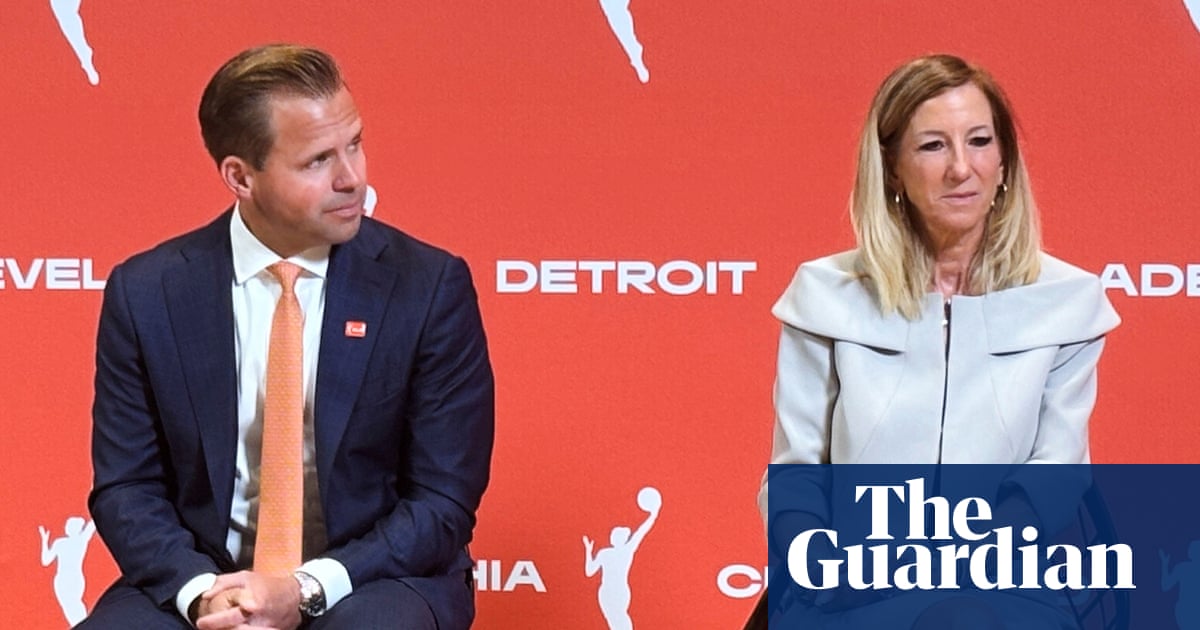TheWNBAis expanding to 18 teams over the next five years, with Cleveland, Detroit and Philadelphia all set to join the league by 2030.
Cleveland will begin play in 2028, Detroit in 2029 and Philadelphia the season after, assuming they get approval from the NBA and WNBA Board of Governors. Toronto and Portland will enter the league next year.
“The demand for women’s basketball has never been higher, and we are thrilled to welcome Cleveland, Detroit, and Philadelphia to the WNBA family,” WNBA commissioner Cathy Engelbert said. “This historic expansion is a powerful reflection of our league’s extraordinary momentum, the depth of talent across the game, and the surging demand for investment in women’s professional basketball.”
All three new teams announced Monday have NBA ownership groups. Each paid a $250m expansion fee, which is about five times as much as Golden State dished out for a team a few years ago. All three teams will also be investing more money through building practice facilities and other such amenities.
“It’s such a natural fit that when you already have this basketball-related infrastructure, these strategies, cultures that you find to be successful, combinations of personnel that you find to be successful,” said Nic Barlage, CEO of Rock Entertainment Group and the Cavaliers. “Extending that into the WNBA, is just a natural next progression, especially if you have a desire to grow like we do.”
Both Cleveland and Detroit had WNBA teams in the past and Philadelphia was the home for an ABL team.
“This is a huge win for Detroit and the WNBA,” Detroit Pistons owner Tom Gores said. “Today marks the long-hoped-for return of the WNBA to a city with deep basketball roots and a championship tradition. Detroit played a key role in the league’s early growth, and we’re proud to reignite that legacy as the WNBA ascends to new heights. Our plans will bring new energy, investment and infrastructure to our city and the WNBA, and additional resources to our community.”
Detroit sports stars Grant Hill, Chris Webber and Jared Goff will have minority ownership stakes in the team.
The Cleveland and Detroit ownership groups said the Rockers and Shock – the names of the previous teams – would be considered but they’d do their due diligence before deciding on what the franchises will be called.
“Rockers will be a part of the mix for sure, but we are at this point, we’re not going to commit to a brand identity because we want to really get into it with our fans, do some research, be very thorough and thoughtful in that process,” Barlage said.
The Detroit and Cleveland teams will play at the NBA arenas that currently exist, while Philadelphia is planning on a new building that will be completed hopefully by 2030.
“We tell the city it’s going to open in 2031. We’re hoping for 2030,” said Harris Blitzer Sports & Entertainment Managing Partner and co-founder Josh Harris, who owns the 76ers. “So we’re trying to underpromise and overdeliver. But, right now it’s 2031, so that we have a year gap, you know. We’ve got the Xfinity center, the Wells Fargo, they’ll play there.”
Adding these three teams will give the league more natural rivalries with another team on the East Coast and Detroit and Cleveland near each other.
“I think there’s some great historical rivalries in the NBA among these cities and, I think that will carry over to the WNBA,” Detroit Pistons vice president Arn Tellem said. “I would love nothing more to have a rivalry like we do in the NBA with Cleveland and Indiana, Philadelphia and New York and all these great cities and, and I think we will.”
Other cities that bid on teams that didn’t get them include St Louis; Kansas City, Missouri; Austin, Texas; Nashville, Tennessee; Houston; Miami; Denver; and Charlotte, North Carolina.
“We didn’t know the demand would be where the demand ended up when we ran the process last fall into the winter,” Engelbert said. “Given the very high demand and supply, we wanted to evaluate, too, because we’re very careful about, you know, making sure we’re balancing the number of roster spots, the number of teams.
“But one thing I’m very struck by as we get into a new media deal, as the media market evolves, you know, being in these three big basketball cities is going to help from a media perspective, a corporate partners perspective.”
All the metrics, such as attendance, television ratings and sponsorships, have been on the rise the last few seasons.
“You’re seeing the key performance indicators around the business, but then also just the communal impact of having a women’s professional sports team,” Barlage said. “The largest growing segment of our Cavs youth academy, which serves 60,000 kids across the state of Ohio and upstate New York, the fastest growing segment is girls. You know, it’s growing at a 30% clip year over year in participation rates. And so for us to be able to create role models, to be able to create symbols of progress, to create having ambassadors within the community representing all of these things.”
